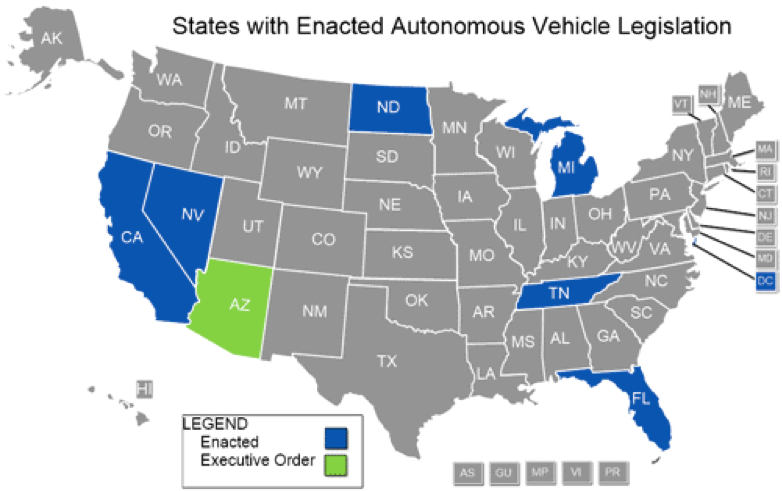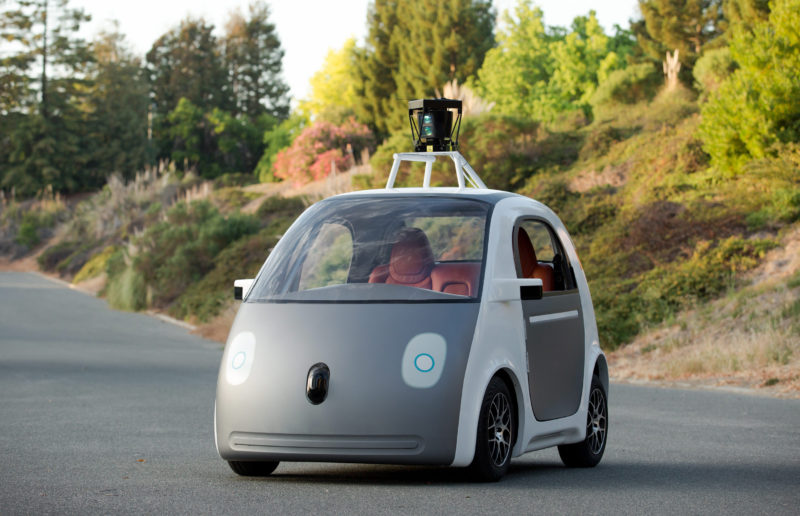Not too long ago self-driving vehicles seemed like something out of a futuristic movie, but that is no longer the case. In fact, self-driving vehicles are already here, being developed and manufactured by companies like Nissan, Tesla, Mercedes, BMW, and Google. In states across the U.S self-driving cars are already on the road. Furthermore according to Business Insider the number of self-driving vehicles on the road is predicted to rise to about 10 million vehicles by the year 2020 (see the graph below, image source: www.businessinsider.com).

Most recently, it was announced that Google would supply a fleet of 5,000 self-driving taxis, called “Zippies” to New York City by 2016. Thus it is clear that self-driving vehicles are here, and will be an increasingly larger part of our roadways. What is unclear is what state and federal laws and regulations will look like regarding self-driving vehicles, or if all states will allow these types of vehicles on their roads.
Self-Driving Car Regulations Across the U.S
The National Highway Traffic Safety Administration or “NHTSA”, the federal agency responsible for advising states on driving laws, and for developing safety standards, has released recommendations concerning self-driving vehicles which state the following:
“NHTSA does not recommend that states authorize the operation of self-driving vehicles for purposes other than testing at this time. We believe there are a number of technological issues as well as human performance issues that must be addressed before self-driving vehicles can be made widely available. Self-driving vehicle technology is not yet at the stage of sophistication or demonstrated safety capability that it should be authorized for use by members of the public for general driving purposes. Should a state nevertheless decide to permit such non-testing operation of self-driving vehicles, at a minimum the state should require that a properly licensed driver (i.e., one licensed to drive self-driving vehicles) be seated in the driver’s seat and be available at all times in order to operate the vehicle in situations in which the automated technology is not able to safely control the vehicle.”
It is clear from the NHTSA’s recommendations that the federal government does not believe self-driving vehicles are ready to be on the roads, but at the same time the federal agency will not stop the states from allowing those vehicles on the roads.
As a result of the NHTSA’s non-interference policy concerning self-driving vehicles, eighteen states including New York, have begun to introduce and debate legislation surrounding the testing of self-driving vehicles, as well as the everyday use of self-driving vehicles. Currently, five states, as shown in the map below (image source: www.ncsl.org) have actually passed legislation, allowing for testing and everyday use of self-driving vehicles.

Out of the states shown on the map above, only Florida and Nevada have enacted legislation that currently allows the everyday person to operate a self-driving vehicle. Nevada has even taken a step further, enacting legislation that allows for individuals operating self-driving vehicles to use mobile devices such as laptops and cellular phones while “operating”. The rest of the states shown above have passed legislation which delegates authority to their respective DMVs, meaning that only once the DMV in each state has written rules and regulations will individuals be allowed to operate self-driving vehicles.
DWI, Traffic Violations and Self-Driving Vehicles
Now that self-driving vehicles are hitting the road it is important to understand how the new laws and regulations governing them will affect traditional crimes and traffic violations associated with the operation of a vehicle. Ideally one would think that owning a self-driving vehicle would eliminate any possibility of receiving a traffic ticket, or a DWI, because after all, the vehicle is driving its self, unfortunately it’s looking as if that will not be the case.
In states where the law is still unsettled regarding self-driving vehicles, drivers of such vehicles will be subject to the law as it applies to a conventional vehicle. This could create some problems, specifically in New York, where there is not law yet on the books either allowing, or prohibiting, self-driving vehicles. This despite the fact New York City will soon have self driving taxis.
There are two sections of New York’s Vehicle and Traffic Law (“VTL”) that specifically conflict, as it stands right now, with operating a self-driving vehicle. The first is VTL section 1226 “Control of Steering Mechanism”, which states:
“No person shall operate a motor vehicle without having at least one hand or, in the case of a physically handicapped person, at least one prosthetic device or aid on the steering mechanism at all times when the motor vehicle is in motion.”
Therefore, as the law stands right now, anyone in New York who operates a self-driving vehicle must still have at least one hand on a steering mechanism. However, for those operating self-driving vehicles, or riding in a self-driving taxi, it is highly unlikely they will have their hands on the steering mechanism and as such they could be issued a violation.
The second section that could pose a conflict with self-driving vehicles is VTL section 1212 “Reckless Driving” a misdemeanor offense, defined as:
“Driving or using any motor vehicle, motorcycle or any other vehicle propelled by any power other than muscular power or any appliance or accessory thereof in a manner which unreasonably interferes with the free and proper use of the public highway, or unreasonably endangers users of the public highway.”
Thus because the statute says driving or using, should a self-driving vehicle malfunction in a way that endangers others on the road, through no fault of the operator, that operator could face up to thirty (30) days in jail and end up with a criminal record.
Aside from laws that directly conflict with the operation of self-driving vehicles, another issue on the horizon is whether or not operators of such vehicles will be subject to DWI laws. In order to be convicted of a DWI or related offense in New York, a driver must be found to have been intoxicated by drugs and/or alcohol while that driver was operating a motor vehicle. The big question is will the New York State Legislature expand the current definition of “operation” to encompass riding in a self-driving vehicle. As is stands right now the New York Court of Appeals has defined operation, in terms of DWI law as:
“When, in a vehicle, a person intentionally does any act or makes use of any mechanical or electrical agency which alone or in sequence will set in motion the motive power of the vehicle.”
Reading the above definition plainly, it is too vague to decide conclusively whether or not riding in a self-driving vehicle would constitute operation for DWI purposes. However, looking at what other states have done to solve this issue could provide a clue as to what New York may do.
California has used the exact language from the NHTSA recommendations to solve the issue of operation and DWI law. The NHTSA recommended that:
“A state should require that a properly licensed driver (i.e., one licensed to drive self-driving vehicles) be seated in the driver’s seat and be available at all times in order to operate the vehicle in situations in which the automated technology is not able to safely control the vehicle.”
Therefore, with the addition of the above mentioned language, California’s law is clear, you cannot be intoxicated while riding in a self-driving vehicle because if intoxicated you could not be available to operate the vehicle should its’ automated technology fail. It is likely that this solution will become the majority approach across the country, that states including New York will take the NHTSA language and place it in their own laws.
The exclusive purpose of this article is educational and it is not intended as either legal advice or a general solution to any specific legal problem. Corporate offices for Nave DWI Defense Attorneys are located at 432 N. Franklin Street, Suite 80, Syracuse, NY 13204; Telephone No.: 1-866-792-7800. Prior results do not guarantee a similar outcome. Attorney Advertising.





